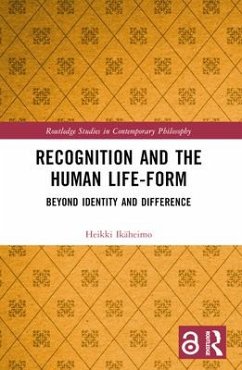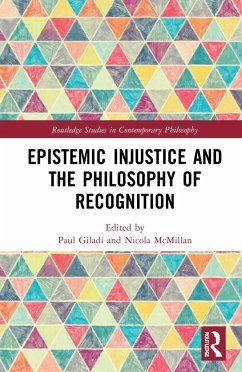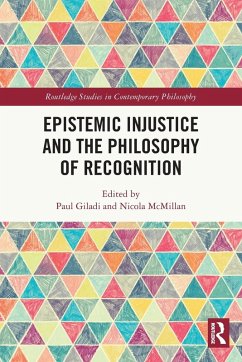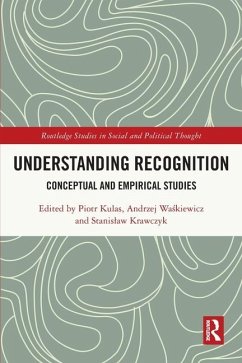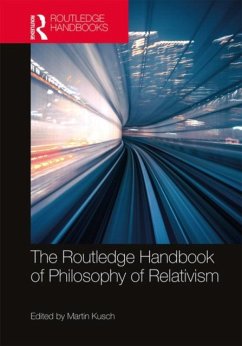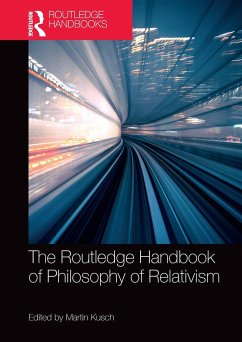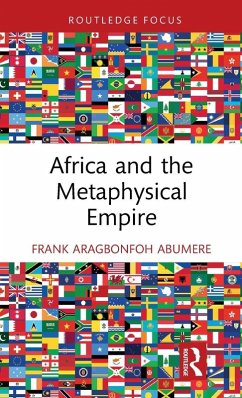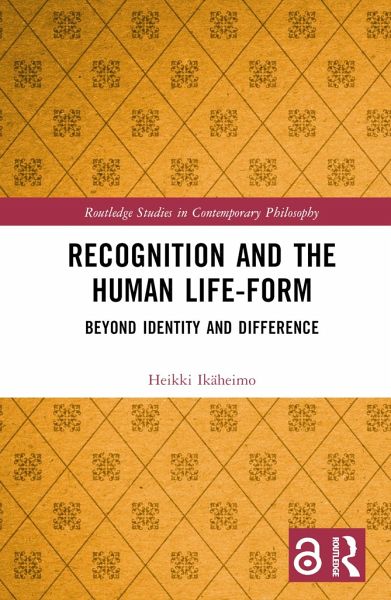
Recognition and the Human Life-Form
Beyond Identity and Difference
Versandkostenfrei!
Versandfertig in 6-10 Tagen
154,99 €
inkl. MwSt.
Weitere Ausgaben:

PAYBACK Punkte
77 °P sammeln!
What is recognition and why is it so important? This book develops a synoptic conception of the significance of recognition in its many forms for human persons by means of a rational reconstruction and internal critique of classical and contemporary accounts.The book begins with a clarification of several fundamental questions concerning recognition. It then reconstructs the core ideas of Fichte, Hegel, Taylor, Fraser, and Honneth and utilizes the insights and conceptual tools developed across these chapters for developing a case for the universal importance of recognition for humans. It argue...
What is recognition and why is it so important? This book develops a synoptic conception of the significance of recognition in its many forms for human persons by means of a rational reconstruction and internal critique of classical and contemporary accounts.
The book begins with a clarification of several fundamental questions concerning recognition. It then reconstructs the core ideas of Fichte, Hegel, Taylor, Fraser, and Honneth and utilizes the insights and conceptual tools developed across these chapters for developing a case for the universal importance of recognition for humans. It argues in favour of a universalist anthropological position, unusual in the literature on recognition, that aims to construe a philosophically sound basis for a discourse of common humanity, or of a shared human life-form for which moral relations of recognition are essential. This synthetic conception of the importance of recognition provides tools for articulating deep intuitions shared across cultures about what makes human life and forms of human co-existence better or worse, and thus tools for mutual understanding about the deepest shared concerns of humanity, or of what makes us all human persons despite our differences.
Recognition and the Human Life-Form will appeal to readers interested in philosophical anthropology, social and political philosophy, critical theory, and the history of philosophy. It also provides ideas and conceptual tools for fields such as anthropology, education, disability studies, international relations, law, politics, religious studies, sociology, and social research.
Chapter 5 of this book is available for free in PDF format as Open Access from the individual product page at www.routledge.com. It has been made available under a Creative Commons Attribution-Non Commercial-No Derivatives 4.0 license.
The book begins with a clarification of several fundamental questions concerning recognition. It then reconstructs the core ideas of Fichte, Hegel, Taylor, Fraser, and Honneth and utilizes the insights and conceptual tools developed across these chapters for developing a case for the universal importance of recognition for humans. It argues in favour of a universalist anthropological position, unusual in the literature on recognition, that aims to construe a philosophically sound basis for a discourse of common humanity, or of a shared human life-form for which moral relations of recognition are essential. This synthetic conception of the importance of recognition provides tools for articulating deep intuitions shared across cultures about what makes human life and forms of human co-existence better or worse, and thus tools for mutual understanding about the deepest shared concerns of humanity, or of what makes us all human persons despite our differences.
Recognition and the Human Life-Form will appeal to readers interested in philosophical anthropology, social and political philosophy, critical theory, and the history of philosophy. It also provides ideas and conceptual tools for fields such as anthropology, education, disability studies, international relations, law, politics, religious studies, sociology, and social research.
Chapter 5 of this book is available for free in PDF format as Open Access from the individual product page at www.routledge.com. It has been made available under a Creative Commons Attribution-Non Commercial-No Derivatives 4.0 license.




